こんにちは。ものさすサイトの裏方でみなさんの記事のお手伝いをしている、京都在住のライター・杉本です。今回は本職のライティングで、ものさすサイトの記事をつくりますよ。
テーマは、モノサスで新しく立ち上がった食の事業「 monosus 社食研(以下、社食研)」。社食研の「社」は、会社の「社」でもあり社会の「社」でもあると捉え、食を通じて社会に関わることにチャレンジしようとしています。
巷ではIT系とかWeb系だと思われているモノサスが、なぜ今「食」という新しい分野で事業をはじめることになったのか? 社食研の荒井茂太さんと真鍋太一さんに、おふたりの出会いから今回の事業を立ち上げるに至った経緯、そしてこれから社食研で何をしようとしているのかまで、まるっとお話をうかがいました。
-
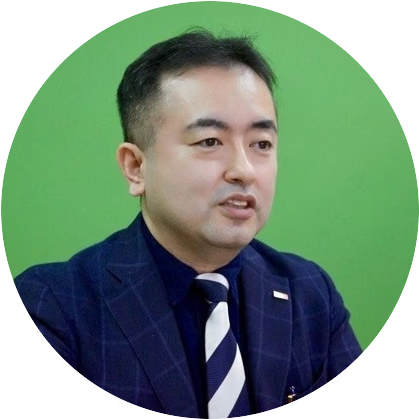 荒井茂太
荒井茂太 -
monosus 社食研 食事業開発ディレクター。Google Japan初代フードマネージャー、フードテックカンパニーのノンピ取締役などを経て2020年6月にモノサスに入社。アップルパイに目がありません。
-
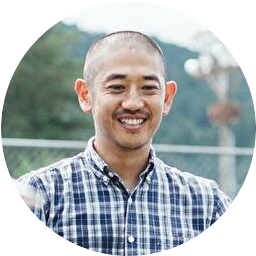 真鍋太一
真鍋太一 -
モノサスCDO(デザイン係)、フードハブ・プロジェクト支配人、the Blind Donkey 支配人。好きな食べ物は、最近は果物(ちょくちょく変わります)。「趣味は実益をかねる」をモットーに最近はもっぱら山に登っている。
出会いはグーグル社内の食育イベント
「考えすぎて食べる日」だった
杉本:おふたりが出会ったのは、東日本大震災直後。グーグルが運営する「イノベーション東北」のウェブサイトをモノサス が担当したときだったそうですね。一緒にお仕事をされて、お互いをどんな風に思っていたんですか?
真鍋:イノベーション東北のときは、そんなにがっつり一緒にやった感じじゃなかったんですよね。初めてちゃんとご一緒した仕事は、2014年に「Think Dish」というグーグル社内での食育のイベントでした。荒井さんは当時グーグル ジャパンのフードマネージャーとしてお会いして。
食材や生産者さんに向き合いながら食べようと、テーマは「Think Dish|考えすぎて食べる日」にして。「Nomadic Kitchen」で一緒に活動していた料理人を呼び、各地の生産者さんから食材を取り寄せていろんなことをやったんですけど、荒井さんはすごく気持ちよく現場を支えてくれる人だなと思いました。
荒井:グーグルの社内レストランやカフェは、朝昼晩ふくめてすべて会社もち。ふだん、社員はフリーで食べられる食堂で初めて6000円の会費をとりました。食のつくり手に対してリスペクトをもつことや、食について考えることを「自分ごと」にしてもらいたかったんです。それでも、参加者枠はすぐに埋まりました。参加したグーグル社員たちからは、会うたびに「食に対して向き合える時間をつくれてよかった」といまだに言われます。
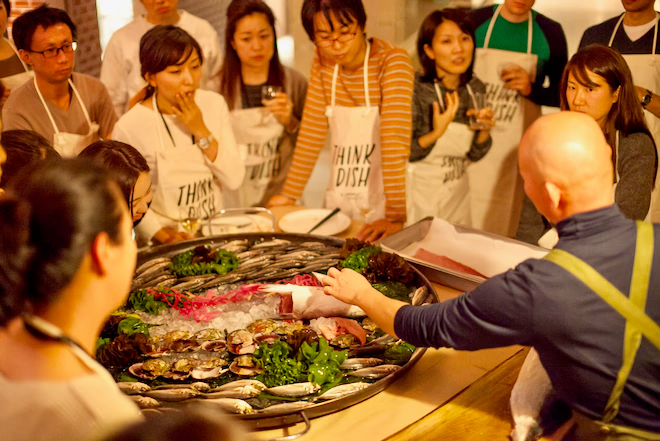
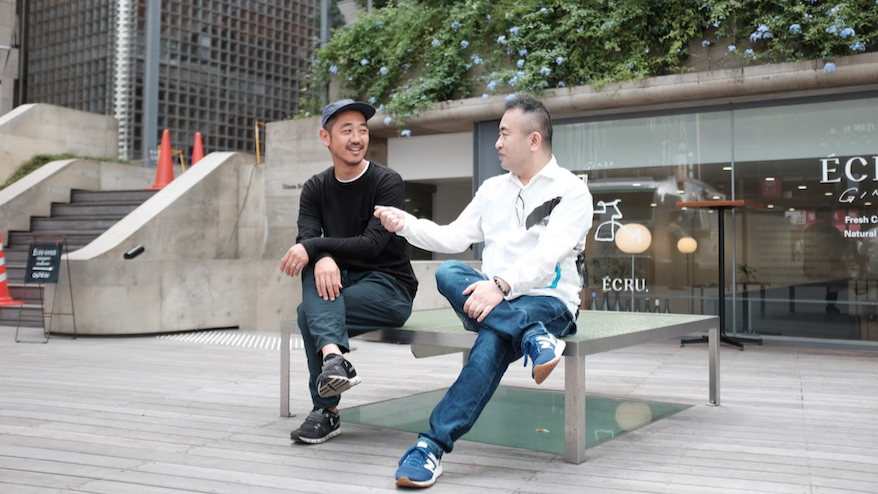
杉本:どうして荒井さんはThink Dishをやりたいと思ったんですか?
荒井:グーグルの社員は、フードサービス全般に真摯に向き合う僕らフードチームに対するリスペクトをもってくれていました。もし、熱量が高い生産者さんと直接つながる機会があれば、彼らのこともリスペクトしてくれるでしょうし、生産者さんも喜んでくれると思ったんです。
真鍋:グーグルの方々は、ものすごく好奇心旺盛な人たちが多いから、すごく掘り下げて質問してくれる。フィードバックがぐわっとくるから、料理人も生産者のみなさんにとってもうれしい経験だっただろうなと思います。
荒井:かつて、社員食堂は「お腹を満たす場」だと考えられていました。でも、大手企業の社員食堂での食のあり方を見直すことは、社員のコミュニケーションを促し、食との向き合い方まで変えることができる。その可能性を、グーグルの社内レストランやカフェという注目度が高い場を使って外に発信したいとも考えていました。
フードハブと社員食堂の共通項としての「日常の食」
杉本:Think Dish以降、荒井さんは2016年にグーグルフードチームを卒業して、フードテックカンパニー「ノンピ」に移られました。その後もおふたりは連絡を取り合っていたんですか?
荒井:グーグルフードチームのチームメンバーだった浅羽暁子さんがフードハブにいるので、彼女から話を聞いて興味を持っていましたし、年に一度は神山を訪問していました。
フードハブは食堂「かま屋」やパンと食品の店「かまパン&ストア」を「日常の食の場」として位置付けています。また、「小さいものと、小さいものをつなぐ(少量生産と少量消費をつなぐ)」ということも、表向きにこういうスローガンを掲げる企業は多いけれど、フードハブは地道にやりつづけている。しかも、事業が垂直に立ち上がっていくから、すごく面白いなあと思って。
杉本:「事業が垂直に立ち上がる」ってどういう意味ですか?
荒井:通常は、農業からはじめてある程度かたちになってから次の事業に手を出して、軌道に乗ったら加工品......と、事業ベースで積み上げていくことが多いと思うんですね。ところが、フードハブは同時多発的に立ち上げていきましたよね。それは、本当に小さい関係性を育んできたからこそできたのかなと思っていて。「こういう取り組みを、都内のオフィスの社食でできたら最高なのに」とふんわり思っていたんです。
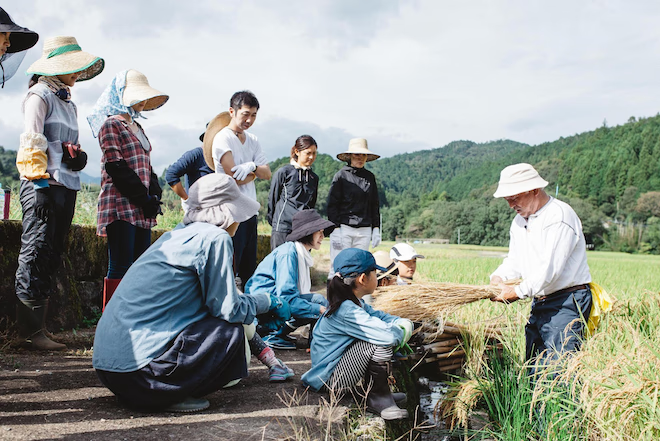
真鍋:だから、荒井さんが前職を辞めると聞いた時に「モノサスで一緒にやりますか?」って話をしたんですよね。「フードハブは地域という特定多数への『日常の食』をつくっているけれど、都会の社食も特定多数の『日常の食』を支えているという意味では同じことだよね」と荒井さんも言ってくれて。
荒井:事業には、深掘りしてブランディングする縦軸の動きと、広げてスケールする横軸の動きが必要でバランスの取り方が大切だと思います。僕は、グーグルという深掘りしつつもスケールする企業のフードチームで働いていたので、食の分野において小さくてもいいから縦軸・横軸が両立できたらいいとずっと思っていました。フードハブはとことん縦軸を深掘りしている事業なので、そのエッセンスを「日常の食」という同じキーワードで都会のオフィスなどに横軸で展開できたら、ビジネス的にもスケールできます。モノサスとフードハブは兄弟会社みたいなものですから、両輪で循環できたらいいねと話し合ったという感じですね。
モノサスという「場」は
やりたいことがある人のためにある
真鍋:フードハブは、私と白桃薫(農業長)との出会いからはじまりました。社食研の事業も、荒井さんという人がいなかったら立ち上げていなかったと思うんです。「企業として、そんなに人に依存した事業をやっていいの?」って感じがあるかもしれませんが、モノサスって真逆で。「やりたいことがある人がいて、モノサスという場でそれが生きるならやろうか」ってはじまっていく。そこがモノサスの良さ、面白さだと思うんですよ。
ただし、私のなかでは「食の分野でなにか事業ができたらいいな」とずーっと考えていたし、モノサスのなかでも言っていたから、何年も前から仕込んでいたとも言える。そのうえで、出会いがあってご縁があって「荒井さんとならできるな」というところではじめたんですよね。
杉本:真鍋さんはどういうところで「荒井さんとならできる」と思ったんですか?
真鍋:仕事の実績で言えば、グーグルの社食で、そんじょそこらのホテルよりもクオリティの高いものを、ウィークデイに毎日2000食出し続ける凄さはわかっていたし。コントラクト(契約)・ビジネスに求められるネゴシエーション力もすばらしいと思っていたので。BtoCではなくBtoBで食の事業をやろうとするときに、荒井さんみたいな人がいないと絶対にできないと思っていたから、そういう意味でも超ベスト・パートナー。
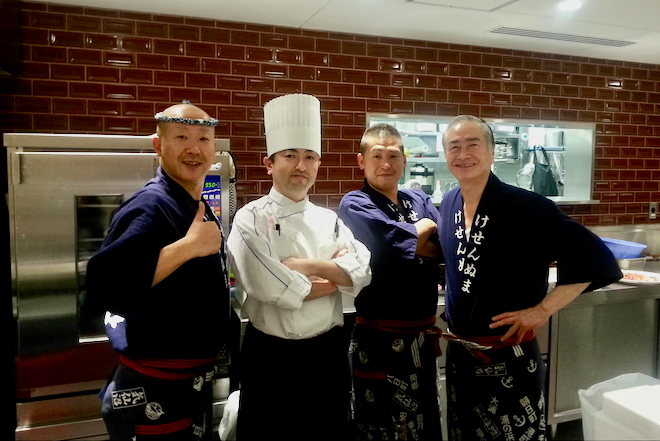
真鍋と出会った当初の荒井
杉本:そんな荒井さんが、これからモノサスで「やりたいこと」はなんですか?
荒井:ひとつは、フードハブが推進している「小さいものと、小さいものをつなぐ」ことを、都会のオフィスで再現するしくみをつくることです。1日に300食、500食を出す社食で、栄養のバランスやメニューの多様性を維持しながら、小さい生産者さんから少しずつ素材を仕入れて生かしていくのは難易度が高いのですが、そこにチャレンジしたいですね。
もうひとつは、「社食=企業の食堂」というところから、ひとつ目線をあげて東京で「地域の食堂」をつくることです。たとえば、オフィスビルのデベロッパーさんはSDGsやまちづくりをミッションに掲げながらも、地下一階に飲食店を誘致する賃料モデルから抜け出せていませんよね。その代わりに、オフィスビルに入居する企業の就業者とまちの人たちが集い、食をともにする地域に開かれた食堂をつくりたいと思います。これは、まだ先になりますがひとつ実現できそうな案件がすでにあります。
杉本:先日、荒井さんはものさすサイトの記事で「モノサスの本業とのシナジーにも大きな可能性があると確信している」と書かれていましたが、具体的にはどういうことでしょうか。
荒井:たとえば、モノサスはBtoB企業のウェブ制作実績が多数あり、それぞれの企業のカルチャーをよく知っています。コントラクト・ビジネスのキモは、企業のカルチャーをよく知ることにあります。しかも、ウェブ制作も社食も窓口は、同じく総務であることが多いんです。これまでモノサスに蓄積されてきた情報や信頼関係を、社食研の事業にも活かせるかもしれません。
もうひとつは、モノサスの本業部分での技術や経験そのものとのシナジーです。飲食業界は、受発注、決済、在庫管理、顧客管理などのシステムなどを統合できずに無駄な作業をしていることが多い。その連携システムをモノサスでつくれたらとも思っています。
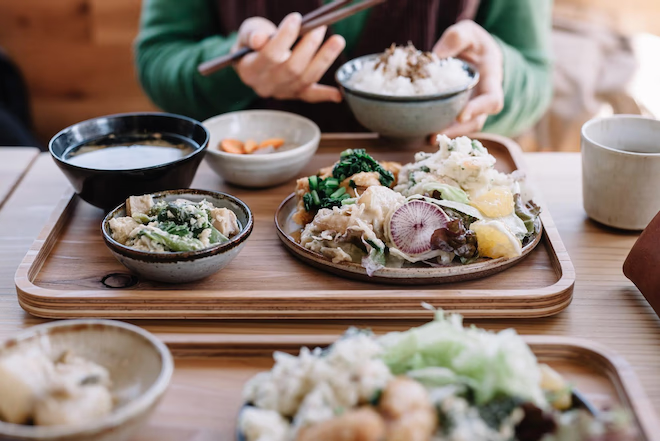
「食べる」から考え直す都会の営み
Ginza Sony Parkではじまるチャレンジ
杉本:真鍋さんは今、社食研で何をやりたいと思っているんですか?
真鍋:新型コロナウイルスの影響でステイホームしないといけなくなったとき、東京の人のほうが「食べる」について考えたと思うんですよ。「働く」と「暮らす」の分け隔てがなくなると、「食べる」が真ん中にくるということを。今後、元に戻ることも戻らないこともあるなかで、社食研としては会社にとっても「食べる」がより大事になるんじゃないかと考えています。
西村佳哲さんは「遊び方の時代から働き方の時代になり、これからは営み方の時代になっていく」と言われていますが、我々は食を通じて営み方を考えていくことをやりたいです。都市で暮らしていても、もうちょっと生産者さんとのつながりを感じながら営むことを、日々の食べることのなかでやれるんじゃないか?という実験ですよね。
杉本:すでに11月28日にGinza Sony Parkの地下3階で「かまパン&フレンズ」の出店という話が決まっているそうですね。
真鍋:これも営み方の実験のひとつです。全国の小さなつくり手が集う「かまパン&フレンズ<ナチュラル物産館>」を2021年9月末まで限定のポップアップで出店します。神山で「地産地食」を合言葉にやってきたことを、銀座の真ん中でやるにはどうするの?という議論をして、「友産友食 - 友と育て、友と食べる」を合言葉にしました。
「友」という文字には、「たすけあう」「同じ考え方、志をもった人」という意味合いがあります。つくることで食べる人を支え、食べることでつくる人を支えるという、お互いを信頼しあい安心が感じられる関係性を銀座の場で提供したいと考えていて。かまパンのパンを中心に、地域密着型のちいさなパン屋さんのパンや無添加食品、コンボサンドや無添加ソフトクリームが集まる予定です。
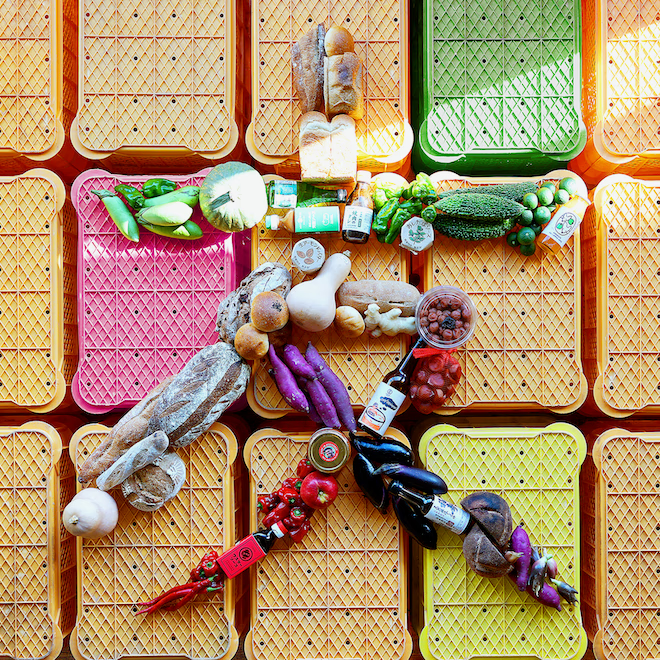
かまパン&フレンズは、今まで出会ってきたさまざまなつくり手と関係を育む場所になる予定。
杉本:「かまパン&フレンズ」の事業については、今後の展開も考えていますか?
真鍋:物産館やアンテナショップは、銀座・有楽町界隈に20軒くらいあって、旅する感覚でめぐる人たちがいると思うんですよ。その文脈に乗せると同時に、たとえばオフィスビル1階のコンビニの代わりに、こうした小さな物産館で買い物をすることが、日常の選択肢のひとつになれないかなと考えています。これも、荒井さんがいるから次の事業展開を組み上げていけるというのは大きくありますね。
杉本:真鍋さんは、ずっとやりたいと思っていた「小さいものと、小さいものをつなぐ」とことをフードハブである程度実現しつつあるけれど、そこで納得せずに東京でもやろうとしているのはどうしてですか?
真鍋:田舎が良くて都会が悪いとか、都会が良くて田舎が悪いとか、経営者と従業員とか。そうじゃないんだよね!っていうのがあって。二項対立じゃない不二(二つに見えるけれど実際にはひとつであること)の世界をどうやったらつくっていけるんだっけ?というのはずっと考えていて、やっぱり東京でいつかはやらないといけないと思っていたんですよね。東京には友人たちもいるし、一緒に働いている子達もいるから。
神山にいると生産者と食べている人は横にいる感じなんですよ。「あなたの野菜、おいしいですね」「おいしいだろう?お前のつくる料理も美味しいよね」。「それを都会でどう実現できるんだっけ?」というのが今回はチャレンジなんですよね。
杉本:荒井さんは、社食研を通してどんな社会、どんな未来を描いていますか?
荒井:日本には、人が集まって友情や愛情を交わし、「いいもの」を共有する団欒という場があり、そこで感性が磨かれてまたいいものが生まれるという循環があったと思うんです。ただ、便利な世の中になってその循環が分断されてしまって、おもしろいものを生み出す感性が育まれなくなってしまっている。本来、日本人には「いいもの」に対するリスペクトがあるので、特に食に対するリスペクトをつくることで、「いいもの」が生まれる循環を広げたいと思います。
杉本:ありがとうございます。まずは銀座の「かまパン&フレンズ」のオープンを楽しみにしています。
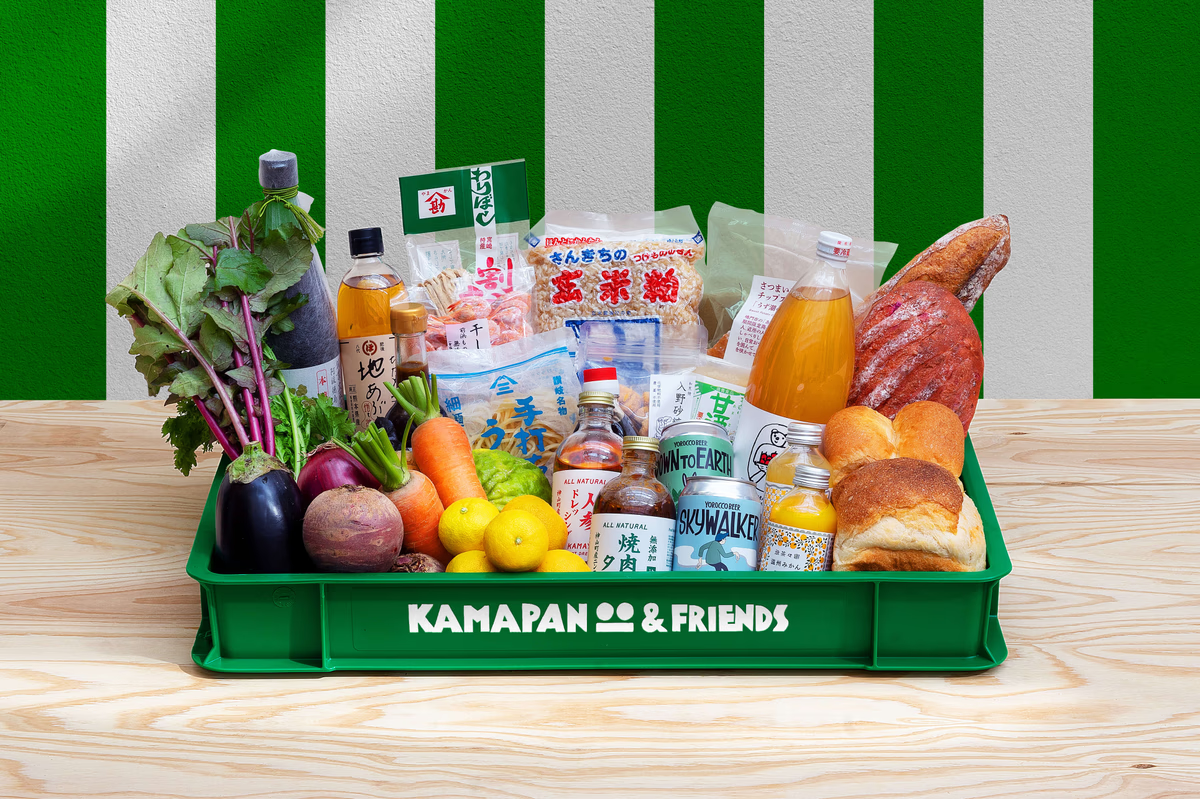
\2020年11月28日OPEN!/
かまパン&フレンズ
<ナチュラル物産館>
11:00-19:00 月曜定休(祝日を除く)
Ginza Sony Park B3
東京メトロ 丸ノ内線・銀座線・日比谷線「銀座駅」B9出口直結
JR 山手線・京浜東北線「有楽町駅」中央口 徒歩約5分
お店の情報はWebサイトやSNSでお知らせしていきます!
Web / Instagram / Facebook
